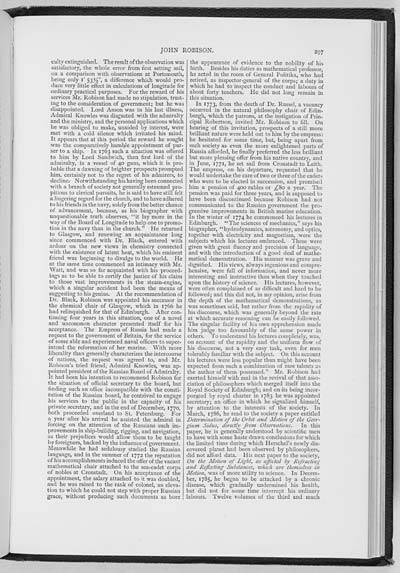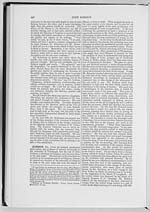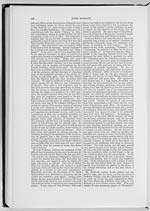297
culty extinguished. The result of the observation was
satisfactory, the whole error from first setting sail,
on a comparison with observations at Portsmouth,
being only I' 53�", a difference which would pro-
duce very little effect in calculations of longitude for
ordinary practical purposes. For the reward of his
services Mr. Robison had made no stipulation, trust-
ing to the consideration of government; but he was
disappointed. Lord Anson was in his last illness,
Admiral Knowles was disgusted with the admiralty
and the ministry, and the personal applications which
he was obliged to make, unaided by interest, were
met with a cold silence which irritated his mind.
It appears that at this period the reward he sought
was the comparatively humble appointment of pur-
ser to a ship. In 1763 such a situation was offered
to him by Lord Sandwich, then first lord of the
admiralty, in a vessel of 40 guns, which it is pro-
bable that a dawning of brighter prospects prompted
him, certainly not to the regret of his admirers, to
decline. Notwithstanding his having been connected
with a branch of society not generally esteemed pro-
pitious to clerical pursuits, he is said to have still felt
a lingering regard for the church, and to have adhered
to his friends in the navy, solely from the better chance
of advancement, because, as his biographer with
unquestionable truth observes, "it lay more in the
way of the Board of Longitude to help one to promo-
tion in the navy than in the church." He returned
to Glasgow, and renewing an acquaintance long
since commenced with Dr. Black, entered with
ardour on the new views in chemistry connected
with the existence of latent heat, which his eminent
friend was beginning to divulge to the world. He
at the same time commenced an intimacy with Mr.
Watt, and was so far acquainted with his proceed-
ings as to be able to certify the justice of his claim
to those vast improvements in the steam-engine,
which a singular accident had been the means of
suggesting to his genius. At the recommendation of
Dr. Black, Robison was appointed his successor in
the chemical chair of Glasgow, which in 1766 he
had relinquished for that of Edinburgh. After con-
tinuing four years in this situation, one of a novel
and uncommon character presented itself for his
acceptance. The Empress of Russia had made a
request to the government of Britain, for the service
of some able and experienced naval officers to super-
intend the reformation of her marine. With more
liberality than generally characterizes the intercourse
of nations, the request was agreed to, and Mr.
Robison's tried friend, Admiral Knowles, was ap-
pointed president of the Russian Board of Admiralty.
It had been his intention to recommend Robison for
the situation of official secretary to the board, but
finding such an office incompatible with the consti-
tution of the Russian board, he contrived to engage
his services to the public in the capacity of his
private secretary, and in the end of December, 1770,
both proceeded overland to St. Petersburg. For
a year after his arrival he assisted the admiral in
forcing on the attention of the Russians such im-
provements in ship-building, rigging, and navigation,
as their prejudices would allow them to be taught
by foreigners, backed by the influence of government.
Meanwhile he had sedulousy studied the Russian
language, and in the summer of 1772 the reputation
of his accomplishments induced the offer of the vacant
mathematical chair attached to the sea-cadet corps
of nobles at Cronstadt. On his acceptance of the
appointment, the salary attached to it was doubled,
and he was raised to the rank of colonel, an eleva-
tion to which he could not step with proper Russian
grace, without producing such documents as bore
the appearance of evidence to the nobility of his
birth. Besides his duties as mathematical professor,
he acted in the room of General Politika, who had
retired, as inspector-general of the corps; a duty in
which he had to inspect the conduct and labours of
about forty teachers. He did not long remain in
this situation.
In 1773, from the death of Dr. Russel, a vacancy
occurred in the natural philosophy chair of Edin-
burgh, which the patrons, at the instigation of Prin-
cipal Robertson, invited Mr. Robison to fill. On
hearing of this invitation, prospects of a still more
brilliant nature were held out to him by the empress:
he hesitated for some time, but, being apart from
such society as even the more enlightened parts of
Russia afforded, he finally preferred the less brilliant
but more pleasing offer from his native country, and
in June, 1771, he set sail from Cronstadt to Leith.
The empress, on his departure, requested that he
would undertake the care of two or three of the cadets
who were to be elected in succession, and promised
him a pension of 400 rubles or �80 a year. The
pension was paid for three years, and is supposed to
have been discontinued because Robison had not
communicated to the Russian government the pro-
gressive improvements in British marine education.
In the winter of 1774 he commenced his lectures in
Edinburgh. "The sciences of mechanics," says his
biographer, "hydrodynamics, astronomy, and optics,
together with electricity and magnetism, were the
subjects which his lectures embraced. These were
given with great fluency and precision of language,
and with the introduction of a good deal of mathe-
matical demonstration. His manner was grave and
dignified. His views, always ingenious and compre-
hensive, were full of information, and never more
interesting and instructive than when they touched
upon the history of science. His lectures, however,
were often complained of as difficult and hard to be
followed; and this did not, in my opinion, arise from
the depth of the mathematical demonstrations, as
was sometimes said, but rather from the rapidity of
his discourse, which was generally beyond the rate
at which accurate reasoning can be easily followed.
The singular facility of his own apprehension made
him judge too favourably of the same power in
others. To understand his lectures completely, was,
on account of the rapidity and the uniform flow of
his discourse, not a very easy task, even for men
tolerably familiar with the subject. On this account
his lectures were less popular than might have been
expected from such a combination of rare talents as
the author of them possessed." Mr. Robison had
exerted himself with zeal in the revival of that asso-
ciation of philosophers which merged itself into the
Royal Society of Edinburgh; and on its being incor-
porated by royal charter in 1783 he was appointed
secretary; an office in which he signalized himself,
by attention to the interests of the society. In
March, 1786, he read to the society a paper entitled
Determination of the Orbit and Motion of the Geor-
gium Sidus, directly from Observations. In this
paper, he is generally understood by scientific men
to have with some haste drawn conclusions for which
the limited time during which Herschel's newly dis-
covered planet had been observed by philosophers,
did not afford data. His next paper to the society,
On the Motion of Light, as affected by Refracting
and Reflecting Substances, which are themselves in
Motion, was of more utility to science. In Decem-
ber, 1785, he began to be attacked by a chronic
disease, which gradually undermined his health,
but did not for some time interrupt his ordinary
labours. Twelve volumes of the third and much

![]() Universal Viewer |
Universal Viewer | ![]() Mirador |
Large image | Transcription
Mirador |
Large image | Transcription
![]()

